Last Updated on April 5, 2023 by Lisa Vargas
Clean drinking water is one of the basic necessities of life. Unfortunately, access to clean and safe drinking water is not always guaranteed, especially during disasters, and water contamination can become a big problem real fast. Drinking contaminated water can lead to a wide range of health problems, including gastrointestinal illnesses, infections, and even cancer.
That’s why it’s essential to learn how to filter water properly to ensure it’s safe for consumption, especially if it’s not readily available. In this article, we’ll explore the use of shungite, a natural mineral, for water filtration and how you can use it to get clean drinking water for you and your family.
I will say upfront that during a SHTF situation, you probably won’t be using this method, unless you have already bought some stones and have been stocking up on them as part of your prepping plan. You can easily get shungite stones on Amazon, but if you haven’t been buying them, then you should have a back up plan for water filtration.
We’ll answer common questions about shungite, including how it works, what it can remove from water, and how to use it effectively for water filtration. So let’s dive in!
What Is Shungite?
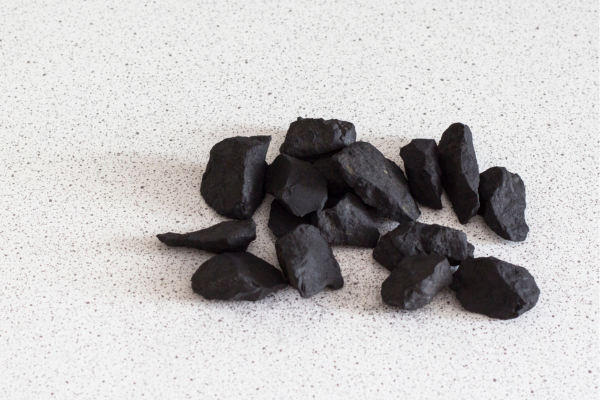
Shungite is a rare mineral found primarily in Russia. It is a type of carbon that is over two billion years old and is known for its unique properties. Shungite is believed to have powerful healing and purification properties, and it is often used for water filtration. Although it’s not commonly found in the U.S., many people still buy it and use it to filter water impurities because of its believed health benefits.
Shungite works by absorbing and neutralizing impurities and toxins in the water, including bacteria, heavy metals, and pesticides. Shungite has a high carbon content, and its unique structure allows it to bond with contaminants in the water, effectively removing them from the water.
Researchers have conducted numerous studies on the effectiveness of shungite for water filtration. One study found that shungite was able to remove up to 90% of fluoride from water. Other studies have shown that shungite can remove a wide range of contaminants, including lead, iron, and bacteria.
Related Articles: Best Ways To Purify Water When Away From Home
Where Can Shungite Be Found?
Shungite is a rare mineral that is primarily found in Russia, specifically in the region of Karelia. While shungite is not commonly found in the United States, there have been some reports of small deposits of shungite in certain areas. However, the quality of shungite found in the US may not be as high as that found in Russia, where the majority of high-quality shungite is sourced. If you are interested in using shungite for water filtration or other purposes, it’s important to ensure that you are using high-quality shungite from a reputable supplier.
Contaminants Removed by Shungite
Shungite is capable of removing a wide range of contaminants from water. Some of the most common contaminants removed by shungite include heavy metals such as lead, mercury, and arsenic, pesticides, and bacteria. Shungite can also remove chlorine and other chemicals commonly found in tap water.
The effectiveness of shungite for removing contaminants from water depends on several factors, including the quality and quantity of shungite used, the length of time the water is in contact with the shungite, and the temperature of the water.
However, shungite is not effective at removing all contaminants from water. For example, shungite is not effective at removing nitrates, nitrites, or dissolved solids from water.
Related Articles: What Is The Best Way To Filter Water: Part 1
Preparing Your Shungite for Filtration
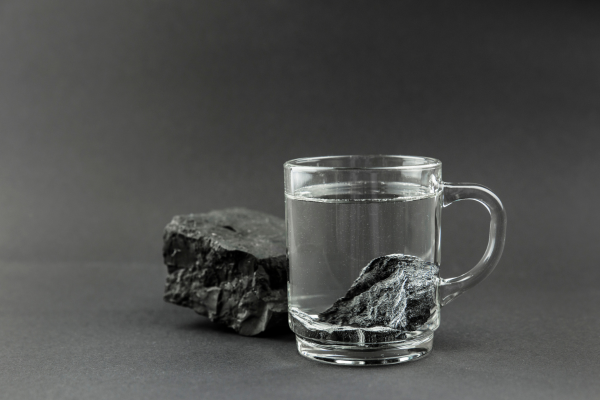
Preparing shungite for water filtration is simple. First, you’ll need to select high-quality shungite stones that are the right size for your filtration system. Shungite stones are available in various sizes, ranging from small pebbles to large rocks. It’s essential to rinse the shungite stones thoroughly with warm water to remove any dust or debris.
Once the shungite stones are clean, you can add them to your water filtration system. Shungite can be used in a variety of filtration systems, including water pitchers, countertop filters, and whole-house filtration systems.
To maintain the effectiveness of shungite, it’s essential to clean the stones periodically. You can clean shungite stones by rinsing them with warm water and allowing them to dry in the sun. It’s also important to replace shungite stones periodically, depending on the level of water contamination and usage.
Using Shungite Water
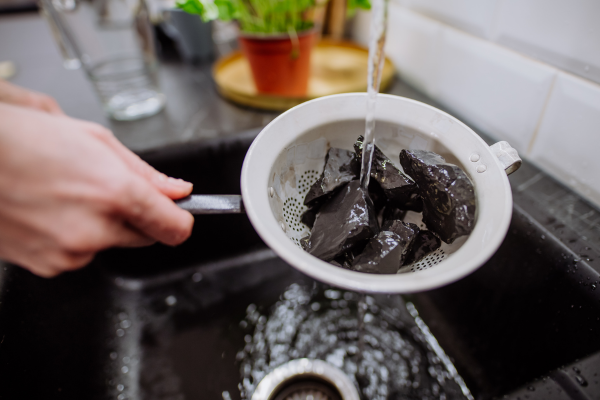
Shungite water has numerous health benefits, including boosting the immune system, improving digestion, and increasing energy levels. Drinking shungite water can also help reduce inflammation and promote overall health and wellness.
To use shungite water for drinking, simply fill a glass or water bottle with shungite-filtered water and drink as normal. Shungite water can also be used for cooking, baking, and making tea and coffee.
It’s important to note that while shungite water has numerous health benefits, it’s not a substitute for proper medical treatment. If you have a medical condition, it’s essential to consult your doctor before consuming shungite water.
One of the unique characteristics of shungite water is its taste. Many people describe the taste of shungite water as smooth, clean, and refreshing. Unlike other types of filtered water, shungite water has a slightly alkaline pH, which can help balance the body’s pH levels.
Shungite vs Other Water Filtration Methods
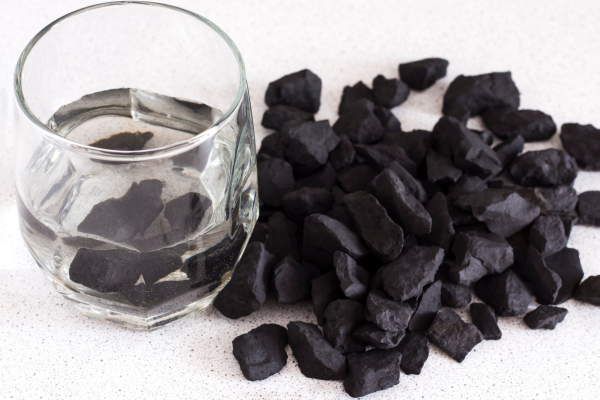
Shungite is just one of many methods for filtering water. Other popular water filtration methods include activated carbon filters, reverse osmosis, and distillation. You can read all about these other water filtration methods in my previous blog posts.
Activated carbon filters are the most common type of water filter and are widely used in households. Activated carbon filters work by adsorbing impurities onto the carbon surface. While activated carbon filters are effective at removing certain contaminants from water, they are not effective at removing all contaminants, and they may not be as effective as shungite for removing certain toxins.
Reverse osmosis is another common water filtration method that uses a semi-permeable membrane to remove impurities from water. Reverse osmosis is effective at removing a wide range of contaminants, including heavy metals, minerals, and bacteria. However, reverse osmosis can be expensive and may remove beneficial minerals from the water.
Distillation is another water filtration method that involves boiling water and collecting the condensed steam. Distillation is effective at removing impurities from water, but it can be time-consuming and expensive.
Compared to other water filtration methods, shungite is an affordable and effective solution for removing a wide range of contaminants from water.
Frequently Asked Questions About Water Filtration with Shungite
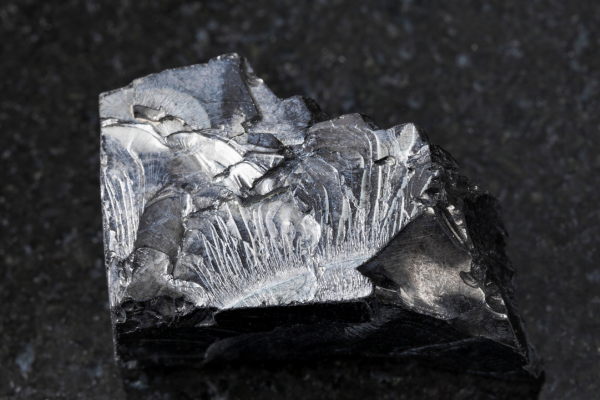
How long do shungite stones last?
Shungite stones are known for their durability and longevity. If properly cared for, shungite stones can last for many years, making them a cost-effective solution for water filtration. However, the lifespan of shungite stones isn’t set in stone (no pun intended) depending on several different factors, including the quality of the stones, the level of water contamination, and how often the stones are used.
It’s important to clean and replace shungite stones periodically to ensure that they are functioning properly and removing contaminants from the water effectively. As a general guideline, shungite stones should be replaced every 6-12 months or as needed based on the level of water contamination and usage.
Where Can You Purchase High Quality Shungite Stones?
High-quality shungite stones for water filtration can be purchased from various online retailers, specialty mineral stores, and wellness shops. When looking to purchase shungite stones, it’s essential to ensure that you are buying from a reputable supplier to ensure the quality and authenticity of the stones.
Look for suppliers that offer information about the origin and quality of the shungite stones and have positive reviews from customers. It’s also important to consider the size and quantity of shungite stones needed for your water filtration system and ensure that you are getting the right size and amount for your needs.
How Do You Choose High-Quality Shungite Stones?
When purchasing shungite stones for water filtration, it’s essential to ensure that you are getting high-quality stones to ensure their effectiveness and durability. Here are some factors to consider when determining the quality of shungite stones:
Origin: High-quality shungite stones are typically sourced from the region of Karelia in Russia, where the best quality shungite is found.
Carbon content: The carbon content of shungite is what gives it its unique properties for water filtration. High-quality shungite stones should have a carbon content of at least 90%.
Color: High-quality shungite stones are typically black or dark gray in color, indicating a high carbon content.
Authenticity: There are different types of shungite, including elite shungite, which is the highest quality and most rare type of shungite. It’s essential to ensure that the shungite stones you are purchasing are authentic and not a lower quality imitation.
Supplier reputation: When purchasing shungite stones, it’s important to buy from a reputable supplier with positive reviews and a track record of selling high-quality stones.
By considering these factors, you can determine the quality of shungite stones and ensure that you are getting the best quality stones for your water filtration needs.
How Much Shungite Do I Need Per Gallon of Water?
The amount of shungite needed for each gallon of water can vary depending on several factors, including the quality of the shungite stones and the level of water contamination. As a general guideline, a good ratio to follow is approximately 100 grams of shungite stones per 1 liter (or 1 quart) of water. This ratio can be adjusted based on the size of your water filtration system and the level of water contamination.
It’s important to note that the contact time between the water and shungite stones is also important for effective water filtration. To ensure that the shungite stones have enough contact time with the water, it’s recommended to let the water sit with the stones for at least 24 hours. The longer the water sits with the shungite stones, the more effective the filtration process will be.
What Type of Filtration System Do I Need?
Shungite can be used in a variety of water filtration systems, depending on your needs and preferences. Some popular options include:
Water pitchers: Shungite stones can be placed in a water pitcher, allowing the water to be filtered as it sits with the stones. This is a simple and affordable option for filtering small amounts of water.
Countertop filters: Countertop water filters can be used with shungite stones to filter larger quantities of water. The water is passed through the shungite stones and other filtration media, removing impurities and improving the taste of the water.
Whole-house filtration systems: Shungite can also be used in whole-house water filtration systems, providing clean and safe water for all household uses, including drinking, cooking, and bathing.
When selecting a filtration system for shungite, it’s important to consider the size of your household, the level of water contamination, and your budget. It’s also essential to ensure that the filtration system is compatible with shungite stones and that the stones can be easily cleaned and replaced as needed.
Final Thoughts
Are you going to use shungite to filter water in a grid down situation? Honestly, probably not. But it’s good to know about it if you are someone who enjoys the hobby of learning new ways to filter water. You can get shungite pretty much anywhere, but it’s especially easy to get shungite rock or stones on Amazon.
